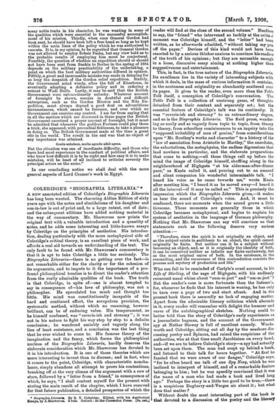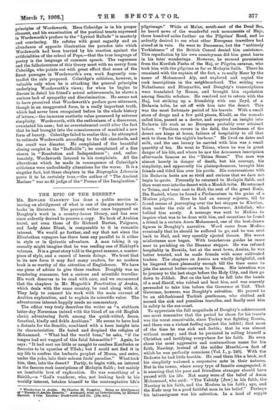COLERIDGE'S "BIOGRAPHIA LITERARIA."*
A NEW annotated edition of Coleridge's Biographia Literaria has long been wanted. The charming Aldine Edition of sixty years ago with the notes and elucidations of his daughter and son-in-law is out of print and, to a large extent, out of date; and the subsequent editions have added nothing material in the way of commentary. Mr. Shawcross now prints the original text with a valuable introduction and a quantity of notes, and he adds some interesting and little-known essays by Coleridge on the principles of aesthetics. His introduc- tion, dealing particularly with the more metaphysical side of Coleridge's critical theory, is an excellent piece of work, and affords a real aid towards an understanding of the text. The only fault to be found with Mr. Shawcross's commentary is that it is apt to take Coleridge a little too seriously. The Biographia Literaria—there is no getting over the fact—is not remarkable either for the clarity or for the cohesion of its arguments, and to impute to it the importance of a pro- found philosophical treatise is to divert the reader's attention from the really admirable qualities of the book. The truth is that Coleridge, in spite of—one is almost tempted to say in consequence of—his love of philosophy, was not a philosopher. He speculated too much and thought too little. His mind was constitutionally incapable of the hard and continued effort, the scrupulous precision, the systematic method, without which no reasoning, however brilliant, can be of enduring value. His temperament, as he himself confessed, was " reverie-ish and streamy " ; it was not in his nature to fight his way step by step to a definite conclusion ; be wandered amiably and vaguely along the line of least resistance, and a conclusion was the last thing that be ever wished to come to. His famous theory of the imagination and the fancy, which forms the philosophical nucleus of the Biographia Literaria, hardly deserves the elaborate consideration which Mr. Shawcross has devoted to it in his introduction. It is one of those theories which are more interesting to invent than to discuss; and in fact, when it comes to the point, Coleridge, with characteristic noncha- lance, simply abandons all attempt to prove his contentions, breaking off at the very climax of the argument with a row of stars, followed by a " letter from a friend," in consequence of which, he says, " I shall content myself for the present with stating the main result of the chapter, which I have reserved for that future publication, a detailed prospectus of which the • Biographia Literarie. By S. T. Coleridge. Edited, with his Aesthetical Essays, by J. 8hawcrosa. 2 vols. Oxford : at the Clarendon Press. [8s. net.j
reader will find at the close of the second volume." Needless to say, the "friend" who intervened so luckily at the critical
moment was Coleridge himself, and the "letter" had been written, as he afterwards admitted, "without taking my pen
off the paper." Devices of this kind would not have been resorted to by a serious thinker anxious to convince his readers of the truth of his opinions; but they are excusable enough in a loose, discursive essay aiming at nothing higher than suggestiveness and entertainment.
This, in fact, is the true nature of the Biographia Literaria. Its excellence lies in the variety of interesting subjects with which it deals, in the mass of curious information it contains, in the acuteness and originality so abundantly scattered over its pages. It gives to the reader, even more than the Table Talk itself, a conception of Coleridge's conversation. The Table Talk is a collection of unstrung gems, of thoughts detached from their context and separately set ; but the essential feature of Coleridge's talk was its continuity. It was " reverie-ish and streamy" to an extraordinary degree,
and so is the Biographia Literaria. The fluid prose, wander. ing so easily and so vaguely from topic to topic, from theory to theory, from schoolboy reminiscences to an inquiry into the "supposed irritability of men of genius," from considerations upon "Mr. Southey's works and character" to a history of the "law of association from Aristotle to Hartley," the anecdotes, the exhortations, the metaphysics, the endless digressions that lead nowhere in particular, and the elaborate preparations that come to nothing,—all these things call up before the
mind the image of Coleridge himself, shuffling along in the neighbourhood of Highgate " at his alderman-after-dinner pace," as Keats called it, and pouring out to au amazed and silent companion his wonderful interminable talk. " I heard his voice as he came towards me," wrote Keats after meeting him, "I heard it as he moved away—I heard it all the interval—if it may be called so." This is precisely the impression which the Biographia Literaria gives,—it makes us hear the sound of Coleridge's voice. And, it must be confessed, there are moments when the sound grows a little tiresome. These moments are generally those in which Coleridge becomes metaphysical, and begins to explain his system of aesthetics in the language of German philosophy.
Nothing that Mr. Shawcross can say will convince us that statements such as the following deserve very serious attention :—
" Therefore, since the spirit is not originally an object, and as the subject exists in antithesis to an object, the spirit cannot originally be finite. But neither can it be a subject without becoming an object, and, as it is originally the identity of both, it can be conceived neither as infinite nor finite exclusively, but as the most original union of both. In the existence, in the reconciling, and the recurrence of this contradiction consists the process and mystery of production and life."
Who can fail to be reminded of Carlyle's cruel account, in his Life of Sterling, of the sage of Highgate, with his endlessly recurrent nasal whine about "sum-m-ject " and "om-m-ject"?
But the reader's case is more fortunate than the listener's, for, whenever be finds that his interest is waning, he has only to turn over a page of two and start afresh. And in the present book there is assuredly no lack of engaging matter.
Apart from the admirable literary criticism which abounds in it, every reader will remember with delight the humour and
verve of the autobiographical sketches. Nothing could be better told than the story of Coleridge's early experiences as
a journalistic bagman, and the account of the Government spy at Nether Stowey is full of excellent comedy. Words- worth and Coleridge, sitting out all day by the seashore dis- cussing poetry and Spinoza, had raised the suspicions of the authorities, who at that time smelt Jacobinism on every hand, and—if we are to believe Coleridge's story—a spy bad actually been set upon them. The man had crept up behind a bank,
and listened to their talk for hours together. " At first ho fancied that we were aware of our danger," Coleridge says, "for he often heard me talk of one Spy Nosy, which he was
inclined to interpret of himself, and of a remarkable feature belonging to him ; but he was speedily convinced that it was
the name of a man who had made a book and lived long ago." Perhaps the story is a little too good to be true,—there is a suspicious Dogberry-and-Verges air about it ; but what
does that matter
Without doubt the most interesting part of the book is that devoted to a discussion of the poetry and the literal/ principles of Wordsworth. Here Coleridge is in his proper element, and his examination of the poetical tenets expressed in Wordsworth's preface to the "Lyrical Ballads" is masterly and convincing. He refutes with great sagacity and an abundance of apposite illustration the paradox into which Wordsworth had been hurried by his reaction against the artificialities of the school of Pope,—that the true language of poetry is the language of common speech. The vagueness and the fallaciousness of this theory meet with no mercy from Coleridge, who points out with great effect that some of the finest passages in Wordsworth's own work flagrantly con- tradict the rule proposed. Coleridge's criticism, however, is valuable only when he is attacking the general principles underlying Wordsworth's views; for when he begins to discuss in detail his friend's actual achievements, he shows a curious lack of sympathy and discrimination. He seems not to have perceived that Wordsworth's preface gave utterance, though in an exaggerated form, to a really important truth, which had never been recognised before in the whole history of letters,—the immense aesthetic value possessed by extreme simplicity. Wordsworth, with the enthusiasm of a discoverer, overstated his case ; but no overstatement could alter the fact that he had brought into the consciousness of mankind a new form of beauty. Coleridge failed to realise this ; he attempted to estimate Wordsworth according to the old standards, and the result was disaster. He complained of the beautiful closing couplet in the "Daffodils "; he complained of a fine stanza in " Resolution and Independence "; and, unfor- tunately, Wordsworth listened to his complaints. All the alterations which he made in consequence of Coleridge's criticisms were undoubtedly alterations for the worse. It is a singular fact, but these chapters in the Biographia Literaria prove it to be certainly true,—the author of " The Ancient Mariner" was no fit judge of the" Poems of the Imagination."















































 Previous page
Previous page